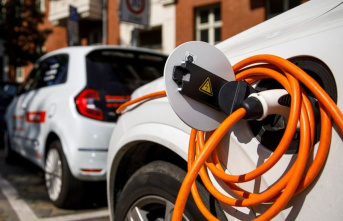China wants to conquer the world – with knowledge and not with tanks. The key word is “new productive forces”. From pure production to know-how. Beijing has been investing in knowledge on a large scale for a long time - and is now reaping the benefits. "If you look at the statistics of the most cited scientific articles, you will hardly find an area where China does not have a leading position," says Peter Fintl, China expert and head of technology
From knowledge comes power and wealth. The gross national product per capita correlates with the country's scientific position in the world. The People's Republic has long been playing in the top division. China is aiming for a dominant position worldwide in several key fields. This has already been achieved in the areas of solar technology and electric cars, and more are to follow. The old Mao strategy is well known: "First we dominate the villages and then the cities." And this strategy was followed. Fintl emphasizes: "China initially looked for areas where the West was not very strong. Based on this, they began to invest extensively in the entire value chain and were thus able to achieve a strong or even dominant position in many areas." And the world is afraid of that. In the USA, people are warning about Beijing's "overcapacity" - with high productivity, low manufacturing costs and a huge industrial base, China will put pressure on international competition.
The EU and the USA want to protect the domestic markets from the price and innovation pressure from the Chinese. This will not succeed in the global market. China is now a gigantic production machine. At the beginning, people relied on a whole army of cheap workers, but this effect wears off as prosperity increases. That's why the Chinese government recognized more than a decade ago that it needed to be a leader in automation. Now you can see the result: cell phone manufacturer Xiaomi recently showed the group's first electric car, the SU7. A video shows the Gigafactory - the fully automated system is supposed to spit out a model every 76 seconds.
According to Fintl, the aim is not only to revolutionize the area of automation with the classic virtues of German mechanical and plant engineering, but also to consistently rely on artificial intelligence. "China wants to take a leading position here, with the aim of exporting this know-how and keeping the licenses for these technologies in Chinese hands."
This is just one of the future areas that the Chinese government has identified and in which companies on the global market will face much stronger competition in the future. "At the beginning of the year, the government defined the new six strategic innovation areas that Beijing wants to focus on. And these include the future of manufacturing from sensors to production machines to the cloud."
"The second field includes information technology, 6G, satellite communications and near-Earth satellites. Then the third is materials research - from sustainable, light to ultra-strong. Then the energy program from hydrogen to solar cells to fusion reactors and thorium-based fuel cycles." Finally, space technology, including non-state actors along the lines of SpaceX. Here we are even thinking ahead - the deep sea and the Earth's mantle are also on the agenda. And lastly, biotechnology and medicine. "The Chinese are also addressing the challenges of aging societies. They are working on tailor-made medicines, for example, and they are investing heavily in this."
This is a master plan for technological world domination. Whether he succeeds is another question. Not everything is rosy in the country. China achieved five percent growth. "In the past, five percent was the absolute minimum that China needed to create enough new jobs." And there are other challenges, says Fintl. Youth unemployment, the birth rate, house prices, industrial productivity. "In Beijing, people have been aware of the diverse challenges for a long time. This new plan for 'technological leadership', even though the foundation stone was laid decades ago, can definitely be seen as a reaction to the problems in China today. Technology and innovation are seen as a large part of the solution."
The question remains: How can Europe survive? In terms of culture and mentality, Europe has good conditions. "Europe is fortunate to be able to build on a strong foundation. The science system and the economic foundation are efficient and offer very good conditions for researchers from all over the world. The challenge remains to industrialize these often groundbreaking basic findings." The major economic blocs in America and Asia are currently overtaking “old” Europe. This is due to the spirit of innovation, but also to the better state conditions, as well as the low hurdles to founding companies. And it is because the government incentives and funding are having an impact. "China and the USA are investing on a large scale, sometimes in an extremely targeted manner. Think of the effect of the American Inflation Reduction Act, which has also led to a renaissance of industry in the USA, or Chinese programs to promote green industry. Despite all the criticism In detail, they are examples of how strategic investments can significantly increase innovation output in the long term. The question is, will Europe as a continent be able to give a powerful answer to this? I'm afraid we in Europe are here for many different reasons a lot of catching up to do."







